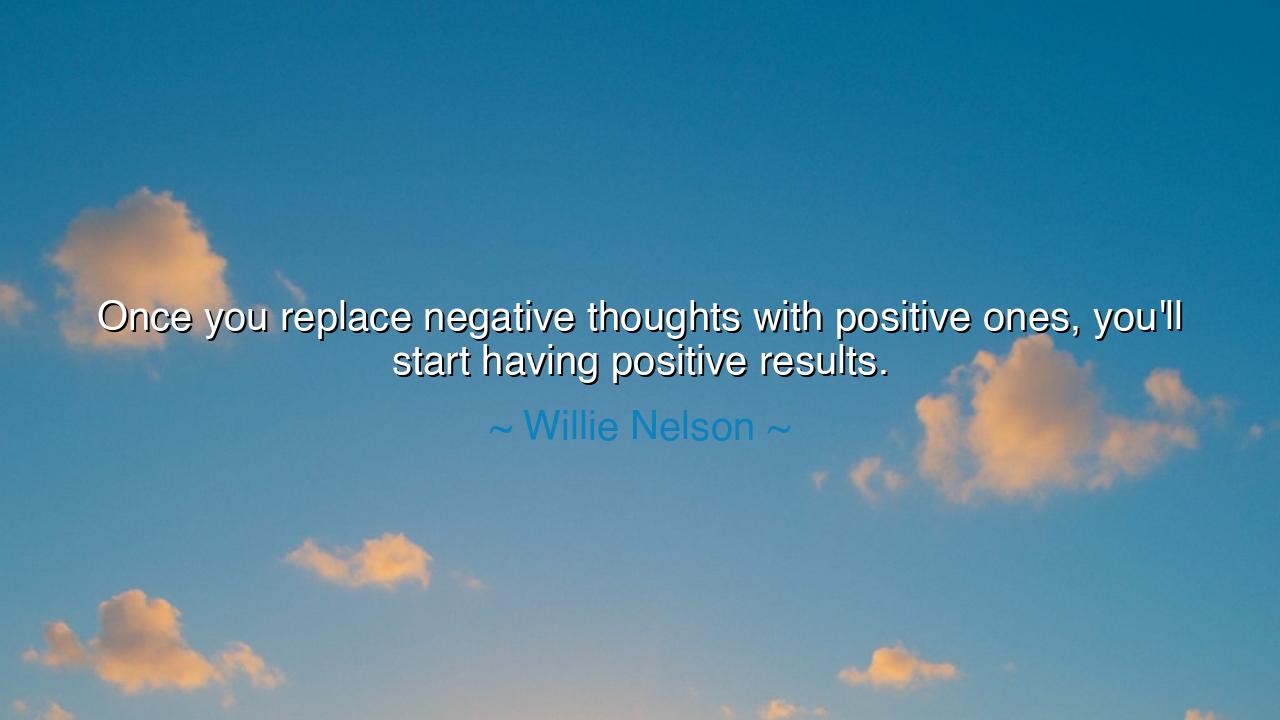
Once you replace negative thoughts with positive ones, you'll
Once you replace negative thoughts with positive ones, you'll start having positive results.






Hear, O children of mind and spirit, the words of Willie Nelson, a voice of music and wisdom, who declared: “Once you replace negative thoughts with positive ones, you’ll start having positive results.” In this simple yet mighty saying lies the law of thought and destiny: that the seeds we plant in the garden of the mind bear fruit in the harvest of our lives. To dwell in negative thoughts is to invite despair, failure, and paralysis. But to replace them with positive thoughts is to summon courage, strength, and victory.
The meaning of this teaching is clear: the mind shapes reality. Thoughts are not idle whispers—they are architects, laying the foundations upon which action and outcome are built. A mind poisoned by fear, bitterness, or doubt creates stumbling and defeat before the journey even begins. But when the mind is filled with hope, faith, and vision, the body and spirit align to produce positive results. What a person believes, they strive toward; what they expect, they often manifest. Thus, transformation begins within.
The origin of these words lies in Nelson’s life as a musician and survivor of hardship. He endured rejection, financial ruin, and personal struggles, yet his spirit remained rooted in positivity. He knew that despair could silence his music and chain his soul, but by cultivating a hopeful mindset, he could endure storms and continue creating. His words echo the wisdom of sages through the ages: change your thoughts, and you change your life.
Consider the story of Thomas Edison, who faced thousands of failures while seeking to invent the lightbulb. If his mind had been dominated by negative thoughts, he would have surrendered to despair. But he reframed each failure as progress, declaring, “I have not failed. I’ve just found 10,000 ways that won’t work.” His positive thinking transformed what seemed like endless defeat into eventual triumph, bringing light to the world.
Think also of Helen Keller, locked in silence and darkness, who could have been consumed by despair. But guided by her teacher Anne Sullivan, she replaced hopelessness with belief in her own ability to learn and communicate. That positive thought became the seed of extraordinary results: she became a writer, a teacher, and a symbol of human resilience. Her life proves Nelson’s wisdom—that when the mind turns from negativity to hope, the results ripple outward into greatness.
O seekers of truth, learn this: the mind is a forge, and you are its blacksmith. Every thought you strike into it shapes the weapon you will wield in life. Strike with despair, and you fashion chains. Strike with positivity, and you fashion wings. What you think becomes what you do, and what you do becomes who you are. Therefore, guard your thoughts with vigilance, for they are the roots of your destiny.
Practical wisdom calls you: when negative thoughts arise, do not cling to them. Replace them swiftly with affirmations of strength. When fear says, “I cannot,” answer with, “I will try.” When bitterness whispers, “Life is against me,” answer with, “Life is teaching me.” Surround yourself with voices of hope and fill your mind daily with uplifting words, images, and deeds. In this way, your thoughts will grow strong and your results will follow their lead.
Therefore remember the counsel of Willie Nelson: “Once you replace negative thoughts with positive ones, you’ll start having positive results.” Let this be your compass. For the battle of life is first won in the battlefield of the mind, and the one who masters their thoughts shall master their fate. Choose positivity, and you shall reap the harvest of courage, success, and peace.
––






APQuynh Anh Pham
This quote really resonates with me because it emphasizes personal responsibility for our mental state. It suggests that transformation begins in the mind before it shows in reality. But I wonder—how do you actually replace negative thoughts in practice? Is it through mindfulness, affirmations, gratitude, or something else? It would be interesting to explore what mental strategies truly help people rewire their thinking patterns for lasting positivity.
TNTrang Nguyen
I love the optimism behind this quote, but I can’t help but question how it applies in tough situations. When people are struggling with anxiety or trauma, positive thinking can sometimes feel unrealistic or even dismissive. Is there a middle ground between acknowledging negative emotions and striving to think positively? Maybe it’s not about erasing negativity, but reframing it so it doesn’t control the direction of your life.
NNNhu Nguyen
This quote feels very encouraging because it connects mindset directly with outcomes. It makes me think about how much our internal dialogue shapes what we experience. Still, I’m curious whether positive thinking alone is enough to create real results. Isn’t action just as important? Maybe the best approach is a combination—positive thoughts that lead to positive actions, which then reinforce that mental shift in a continuous cycle.
TXNguyen Thanh Xuan
I really like the simplicity of this idea—it’s straightforward yet powerful. But I wonder, is it truly that easy to replace negative thoughts with positive ones? Sometimes negativity feels almost automatic, especially when you’ve faced repeated setbacks. Maybe the real challenge isn’t just thinking positively but believing those positive thoughts deeply enough to change behavior. How do we make positivity a habit rather than just a temporary mindset?